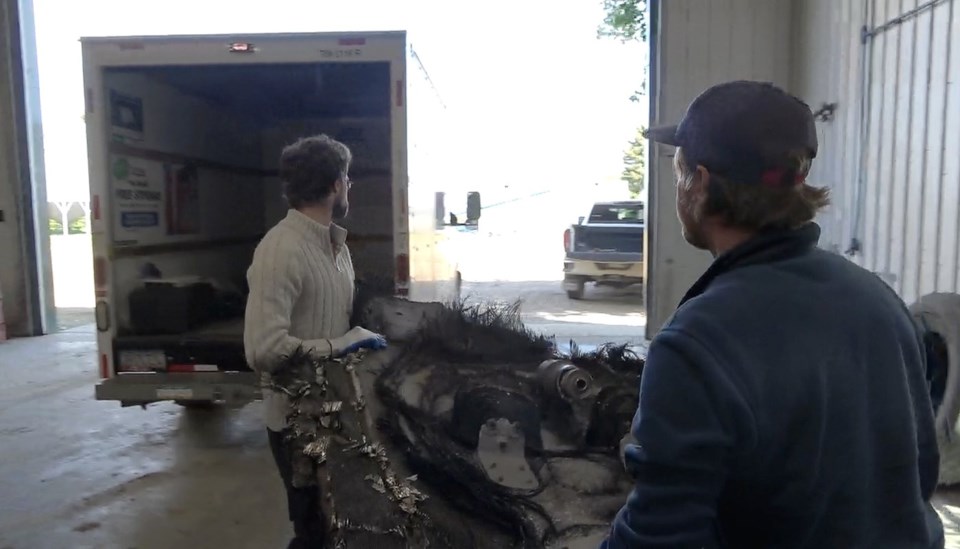ITUNA, Sask. — Two men with SpaceX descended on a Saskatchewan farm in a moving truck Tuesday to retrieve cosmic junk that fell earlier this year from one of its spacecrafts.
The workers, who didn't give their names while at the farm near Ituna, lugged the large scorched pieces of carbon fibre and aluminum into the back of the U-Haul before leaving.
They declined to say why the fragments failed to burn up before slamming into the field, what spacecraft the pieces came from, where the wreckage was going and what the company plans to do with it.
They confirmed they work for SpaceX, founded by entrepreneur Elon Musk, and directed further questions to a company email. SpaceX did not immediately respond to a request for comment Tuesday.
The retrieval comes months after farmer Barry Sawchuk found the debris and said he was contacted by SpaceX for its return.
One fragment, taller than Sawchuk, weighs 44 kilograms. A second, smaller one is about 10 kilograms. Other pieces were also found on neighbouring farms.
Sawchuk said SpaceX paid him an undisclosed amount of money to get the junk back, and he plans to use those dollars to help fund a new rink in the community northeast of Regina.
He said having the men show up Tuesday felt like any other day.
"It's no different than going to seed a crop or harvesting a good crop. It's all just the same thing," Sawchuk told reporters.
"I guess the one thing is it's a little community that is on the map. Let's hope it doesn't happen again and somebody doesn't get hurt."
Sawchuk, who briefly spoke with the SpaceX staff, said they told him the company wants to figure out why the debris didn't dissolve in the atmosphere.
"They realized there was an issue, so they're trying to deal with it," he said.
Samantha Lawler, an astronomy professor at the University of Regina who was at the farm to witness the retrieval, said she wanted to learn why the space junk didn't burn up.
She said the company has thousands of Starlink satellites in orbit that are expected to re-enter Earth in batches over the next few years. There will be problems if they hit the ground, she said.
"If those re-entries make it to the ground in hundred-pound pieces of garbage, like we just saw, that (could) kill lots of people. It's terrifying."
Lawler added she wasn't surprised the SpaceX workers didn't share more details.
"SpaceX is so notorious for not responding to journalists, ever," she said.
Lawler previously sent photos and information about Sawchuk’s debris to Jonathan McDowell, an astrophysicist at Harvard who tracks space launches.
Looking at data, McDowell determined the farmer's find was likely linked to a SpaceX Dragon spacecraft that returned to Earth with four passengers from the International Space Station in February.
Debris has also been found in other locations in the United States and Australia.
This report by The Canadian Press was first published June 11, 2024.
Jeremy Simes, The Canadian Press



